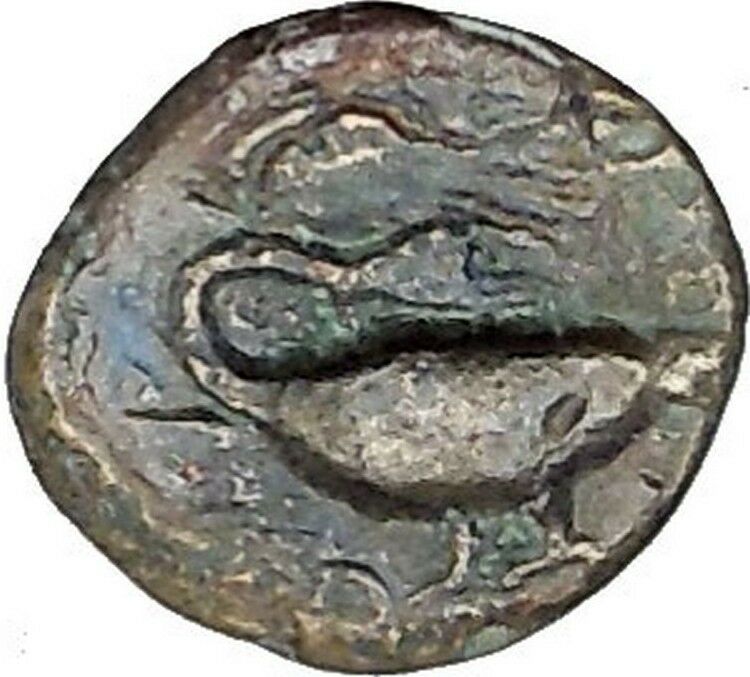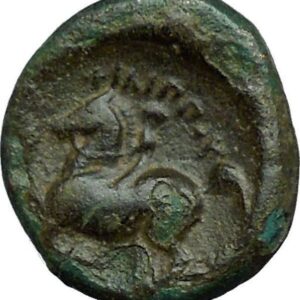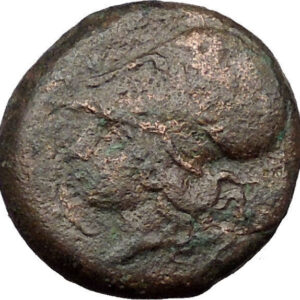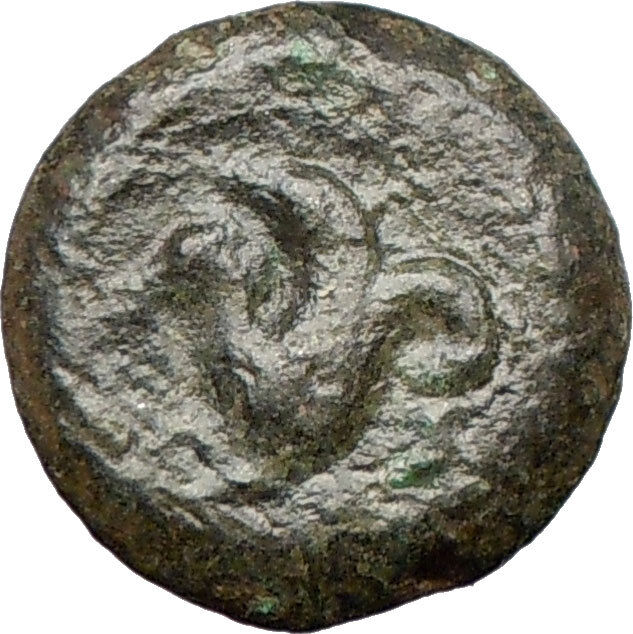|
Greek coin of the Kingdom of Macedonia
Perseus – King: 179-168 B.C.
Bronze 18mm (6.26 grams) Mint of Pella or Amphiplis, struck circa 179-168 B.C.
Reference: HGC 3, 1096 Rare R2; Sear 6808: AMNG III.2, p. 196, nos. 9-10
Head of young Hercules in lion skin headdress.
Horseman prancing right; in field to right, BA and ΠΕΡ monogram; monograms below.
The eldest son of Philip V, Perseus was the last king of Macedon. He inherited a kingdom already largely dependent on Rome, but his policies aroused Roman suspicions and armed conflict became inevitable. At the battle of Pydna, in 168 B.C., Perseus lost his kingdom and he died two years later as an exile in Italy.
You are bidding on the exact item pictured, provided with a Certificate of Authenticity and Lifetime Guarantee of Authenticity.
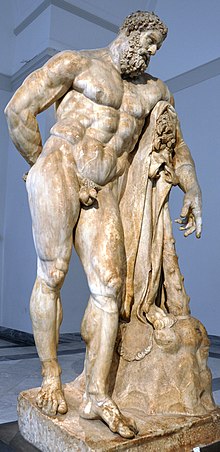 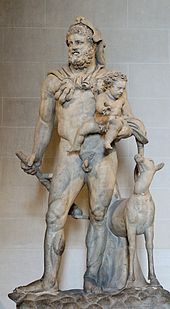 Heracles, born Alcaeus (Alkaios) or Alcides, was a divine hero in Greek mythology, the son of Zeus and Alcmene, foster son of Amphitryon and great-grandson and half-brother (as they are both sired by the god Zeus) of Perseus. He was the greatest of the Greek heroes, a paragon of masculinity, the ancestor of royal clans who claimed to be Heracleidae and a champion of the Olympian order against chthonic monsters. In Rome and the modern West, he is known as Hercules, with whom the later Roman emperors, in particular Commodus and Maximian, often identified themselves. The Romans adopted the Greek version of his life and works essentially unchanged, but added anecdotal detail of their own, some of it linking the hero with the geography of the Central Mediterranean. Details of his cult were adapted to Rome as well. Heracles, born Alcaeus (Alkaios) or Alcides, was a divine hero in Greek mythology, the son of Zeus and Alcmene, foster son of Amphitryon and great-grandson and half-brother (as they are both sired by the god Zeus) of Perseus. He was the greatest of the Greek heroes, a paragon of masculinity, the ancestor of royal clans who claimed to be Heracleidae and a champion of the Olympian order against chthonic monsters. In Rome and the modern West, he is known as Hercules, with whom the later Roman emperors, in particular Commodus and Maximian, often identified themselves. The Romans adopted the Greek version of his life and works essentially unchanged, but added anecdotal detail of their own, some of it linking the hero with the geography of the Central Mediterranean. Details of his cult were adapted to Rome as well.
Extraordinary strength, courage, ingenuity, and sexual prowess with both males and females were among the characteristics commonly attributed to him. Heracles used his wits on several occasions when his strength did not suffice, such as when laboring for the king Augeas of Elis, wrestling the giant Antaeus, or tricking Atlas into taking the sky back onto his shoulders. Together with Hermes he was the patron and protector of gymnasia and palaestrae. His iconographic attributes are the lion skin and the club. These qualities did not prevent him from being regarded as a playful figure who used games to relax from his labors and played a great deal with children. By conquering dangerous archaic forces he is said to have “made the world safe for mankind” and to be its benefactor. Heracles was an extremely passionate and emotional individual, capable of doing both great deeds for his friends (such as wrestling with Thanatos on behalf of Prince Admetus, who had regaled Heracles with his hospitality, or restoring his friend Tyndareus to the throne of Sparta after he was overthrown) and being a terrible enemy who would wreak horrible vengeance on those who crossed him, as Augeas, Neleus and Laomedon all found out to their cost.
Perseus (Greek: Περσεύς) (ca. 212 BC – 166 BC) was the last king (Basileus) of the Antigonid dynasty, who ruled the successor state in Macedon created upon the death of Alexander the Great. He also has the distinction of being the last of the line, after losing the Battle of Pydna on 22 June 168 BC; subsequently Macedon came under Roman rule.
In 179 BC Philip V of Macedon died. In the previous year Philip had his pro-Roman son Demetrius executed. Perseus had been jealous of Demetrius’ success as ambassador to Rome and had convinced their father to have him poisoned as a potential usurper. The Romans favored Demetrius, and Perseus’ role in killing Demetrius did not endear him to Rome when he took the throne.
One of his first acts on becoming king was to renew the treaty with Rome. Yet, Perseus’ other actions troubled Rome. His interference in the affairs of his neighbors, his ousting of Roman ally Abrupolis from his territories, his armed visit to Delphi, his avoidance of the Roman ambassadors to Macedonia, and his dynastic marriages all gave Rome cause for concern. Soon Rome and Perseus went to war in the Third Macedonian War (171-168 BC). Although Perseus had some initial success, the war ended with the King’s surrender to the Roman general Lucius Aemilius Paullus after his decisive defeat at the Battle of Pydna, and his eventual imprisonment in Rome with his half-brother Philippus and son Alexander. Blaise Pascal mentions in his Pensées (Lafuma 15) that Perseus was blamed for not committing suicide, supposedly after his defeat and capture at Pydna. The Antigonid kingdom was dissolved, and replaced with four republics. Andriscus of Macedon broke off the Roman rule for about a year, but was defeated in 148 BC by the Romans. In 146 BC, the four republics were dissolved, and Macedon officially became the Roman province of Macedonia.
On 178 BC he had married Laodicea, daughter of Seleuco IV from Syria. Perseus’ one son, Alexander, was still a child when Perseus was conquered by the Romans, and after the triumph of Aemilius Paullus in 167 BC, was kept in custody at Alba Fucens, together with his father. He became a skillful toreutes, learned the Latin language, and became a public notary.
 Macedonia or Macedon was an ancient kingdom on the northern periphery of Classical Greece and later the dominant state of Hellenistic Greece. It was ruled during most of its existence initially by the legendary founding dynasty of the Argeads, the intermittent Antipatrids and finally the Antigonids. Home to the Macedonians, the earliest kingdom was centered on the northeastern part of the Greek peninsula, bordered by Epirus to the west, Paeonia to the north, the region of Thrace to the east and Thessaly to the south. Macedonia or Macedon was an ancient kingdom on the northern periphery of Classical Greece and later the dominant state of Hellenistic Greece. It was ruled during most of its existence initially by the legendary founding dynasty of the Argeads, the intermittent Antipatrids and finally the Antigonids. Home to the Macedonians, the earliest kingdom was centered on the northeastern part of the Greek peninsula, bordered by Epirus to the west, Paeonia to the north, the region of Thrace to the east and Thessaly to the south.
The rise of Macedon, from a small kingdom at the fringe of typical Greek city states affairs, to one which came to control the fate of the entire Hellenic world, occurred under the reign of Philip II. With the innovative Macedonian army, he defeated the old powers of Athens and Thebes in the decisive Battle of Chaeronea in 338 BC and subdued them, while keeping Sparta in check. His son Alexander the Great pursued his father’s effort to command the whole of Greece through the federation of Greek states, a feat he finally accomplished after destroying a revolting Thebes. Young Alexander was then ready to lead this force, as he aspired, in a large campaign against the Achaemenid Empire, in retaliation for the invasion of Greece in the 5th century BC.
In the ensuing wars of Alexander the Great, he was ultimately successful in conquering a territory that came to stretch as far as the Indus River. For a brief period his Macedonian Empire was the most powerful in the world, the definitive Hellenistic state, inaugurating the transition to this new period of Ancient Greek civilization. Greek arts and literature flourished in the new conquered lands and advancements in philosophy and science were spread to the ancient world. Of most importance were the contributions of Aristotle, a teacher to Alexander, whose teachings carried on many centuries past his death.
After the death of Alexander the Great in 323 BC, the following wars of the Diadochi and the partitioning of his short-lived empire, Macedonia proper carried on as a Greek cultural and political center in the Mediterranean region along with Ptolemaic Egypt, the Seleucid Empire, and the Attalid kingdom. Important cities like Pella, Pydna, and Amphipolis were involved in power struggles for control of the territory, and new cities were founded, like Thessalonica by the usurper Cassander, which is now the second largest city of modern day Greece. Macedonia’s decline of influence began with the rise of Rome until its ultimate subjection during the second Macedonian Wars.
 The Roman province of Macedonia (Latin: Provincia Macedoniae, Greek: Ἐπαρχία Μακεδονίας) was officially established in 146 BC, after the Roman general Quintus Caecilius Metellus defeated Andriscus of Macedon, the last self-styled King of the ancient kingdom of Macedonia in 148 BC, and after the four client republics (the “tetrarchy”) established by Rome in the region were dissolved. The province incorporated ancient Macedonia, with the addition of Epirus, Thessaly, and parts of Illyria, Paeonia and Thrace. This created a much larger administrative area, to which the name of ‘Macedonia’ was still applied. The Dardanians, to the north of the Paeonians, were not included, because they had supported the Romans in their conquest of Macedonia. The Roman province of Macedonia (Latin: Provincia Macedoniae, Greek: Ἐπαρχία Μακεδονίας) was officially established in 146 BC, after the Roman general Quintus Caecilius Metellus defeated Andriscus of Macedon, the last self-styled King of the ancient kingdom of Macedonia in 148 BC, and after the four client republics (the “tetrarchy”) established by Rome in the region were dissolved. The province incorporated ancient Macedonia, with the addition of Epirus, Thessaly, and parts of Illyria, Paeonia and Thrace. This created a much larger administrative area, to which the name of ‘Macedonia’ was still applied. The Dardanians, to the north of the Paeonians, were not included, because they had supported the Romans in their conquest of Macedonia.
|





 Heracles, born Alcaeus (Alkaios) or Alcides, was a divine hero in Greek mythology, the son of Zeus and Alcmene, foster son of Amphitryon and great-grandson and half-brother (as they are both sired by the god Zeus) of Perseus. He was the greatest of the Greek heroes, a paragon of masculinity, the ancestor of royal clans who claimed to be Heracleidae and a champion of the Olympian order against chthonic monsters. In Rome and the modern West, he is known as Hercules, with whom the later Roman emperors, in particular Commodus and Maximian, often identified themselves. The Romans adopted the Greek version of his life and works essentially unchanged, but added anecdotal detail of their own, some of it linking the hero with the geography of the Central Mediterranean. Details of his cult were adapted to Rome as well.
Heracles, born Alcaeus (Alkaios) or Alcides, was a divine hero in Greek mythology, the son of Zeus and Alcmene, foster son of Amphitryon and great-grandson and half-brother (as they are both sired by the god Zeus) of Perseus. He was the greatest of the Greek heroes, a paragon of masculinity, the ancestor of royal clans who claimed to be Heracleidae and a champion of the Olympian order against chthonic monsters. In Rome and the modern West, he is known as Hercules, with whom the later Roman emperors, in particular Commodus and Maximian, often identified themselves. The Romans adopted the Greek version of his life and works essentially unchanged, but added anecdotal detail of their own, some of it linking the hero with the geography of the Central Mediterranean. Details of his cult were adapted to Rome as well. Macedonia or Macedon was an ancient kingdom on the northern periphery of Classical Greece and later the dominant state of Hellenistic Greece. It was ruled during most of its existence initially by the legendary founding dynasty of the Argeads, the intermittent Antipatrids and finally the Antigonids. Home to the Macedonians, the earliest kingdom was centered on the northeastern part of the Greek peninsula, bordered by Epirus to the west, Paeonia to the north, the region of Thrace to the east and Thessaly to the south.
Macedonia or Macedon was an ancient kingdom on the northern periphery of Classical Greece and later the dominant state of Hellenistic Greece. It was ruled during most of its existence initially by the legendary founding dynasty of the Argeads, the intermittent Antipatrids and finally the Antigonids. Home to the Macedonians, the earliest kingdom was centered on the northeastern part of the Greek peninsula, bordered by Epirus to the west, Paeonia to the north, the region of Thrace to the east and Thessaly to the south. The Roman province of Macedonia (Latin: Provincia Macedoniae, Greek: Ἐπαρχία Μακεδονίας) was officially established in 146 BC, after the Roman general Quintus Caecilius Metellus defeated Andriscus of Macedon, the last self-styled King of the ancient kingdom of Macedonia in 148 BC, and after the four client republics (the “tetrarchy”) established by Rome in the region were dissolved. The province incorporated ancient Macedonia, with the addition of Epirus, Thessaly, and parts of Illyria, Paeonia and Thrace. This created a much larger administrative area, to which the name of ‘Macedonia’ was still applied. The Dardanians, to the north of the Paeonians, were not included, because they had supported the Romans in their conquest of Macedonia.
The Roman province of Macedonia (Latin: Provincia Macedoniae, Greek: Ἐπαρχία Μακεδονίας) was officially established in 146 BC, after the Roman general Quintus Caecilius Metellus defeated Andriscus of Macedon, the last self-styled King of the ancient kingdom of Macedonia in 148 BC, and after the four client republics (the “tetrarchy”) established by Rome in the region were dissolved. The province incorporated ancient Macedonia, with the addition of Epirus, Thessaly, and parts of Illyria, Paeonia and Thrace. This created a much larger administrative area, to which the name of ‘Macedonia’ was still applied. The Dardanians, to the north of the Paeonians, were not included, because they had supported the Romans in their conquest of Macedonia.

